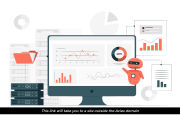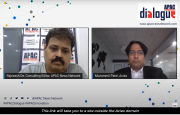Banks in Vietnam have come a long way. From humble beginnings in the 1970s with the emergence of state-owned banks, to today having several commercial banks with quite a few in ventures with large global banks. The landscape for banking in general has changed from being a pure deposit-accepting and loan-giving institutions to being the primary center for facilitating financial transactions at an international scale.
A big difference between Vietnam and say the USA, is that Vietnam is a relative newcomer to an open economy, and with that banks emerging from humble beginnings are now going full steam into digitalization with relatively less to no baggage in decades-old legacy systems. A large portion of Vietnam banks, especially the joint-stock banks have shareholders where non-financial entities are major investors. Some are also part of a much larger group/ conglomerates as well involved in multiple enterprise businesses. For these types of banks, digitization to cross leverage data for growth can be a winning formula.
With financial services become increasingly more commoditized and competitive over time , as customers become more immersed in all things digital, especially using digital channels like a mobile device, it perhaps became apparently clear that perhaps the truest path to future growth is tying all pieces within a group structure, internal and external, with information and products through single channels electronically.
An Indonesian conglomerate that we had the privilege of speaking to a few years back had the vision to building single shopping malls which ties in all their core areas. Imagine going into a mall - let's call this XYC Mall. You stop for a coffee and pay with XYC branded credit card and go on to purchase other items from the same mall with the same credit card. When you finish your purchases, you go upstairs to book a vacation with XYC Travel Agency using an XYC loyalty card to get discounts from all previous shopping. Then a week later you fly to XYC Vacation Resort. And in the hotel room get access to cable TV and news on XYC Satellite services. All this while in the background XYC Company is pushing sales and discounts privileges on what to buy, how you pay and where you vacation as they have this data enriched by your preferences.
Vietnam banks are embarking on such a revolution. The key to such a digital revolution is of course data. But with different business verticals spread across the organization, running on different system platforms, which do not talk to other business verticals, the task is daunting, similar to the Indonesian example above. Without a clear strategy to tie all this together, the vision of a single brand to the customer is a pipe dream. The challenge and first course of a defined strategy are of course a ‘Data Framework’.
A simple aspect like knowing who your customers are despite which business vertical they liaise with is a huge challenge. It is very common for someone to fill in multiple forms every time they need to interact with a business entity/ vertical even if these business entities/ verticals are all part of the same group. You would think the group entity will have all your data no matter who you interact with, but this is far from the truth.
So why start with a single data framework strategy. Perhaps several core reasons:
The simplest answer is you know who your customers are i.e. a single 360 view:
Having a 360 view affords a lot of opportunities to cross and upsell but also streamlines other areas in terms of efficiency andquality of customers which ultimately impacts profitability. More importantly, it enables eKYC to be done accurately once when the customer is onboarded and adds value to their experience with your business - not multiple times whenever they come in to apply for any financial product offered by the group, a situation a Malaysian bank is experiencing as they have no single 360 views of their customer. As more and more services are digitized, and more services are pushed onto a mobile or portable device as a channel, a single customer view aided by single eKYC will take focus.From a profitability perspective, banks are increasingly being regulated:
In Vietnam, it's no different. Basel II compliance and hence the importance of credit risk has taken center stage. It is clear that the credit risk that a bank takes on will impact its profitability and its capital requirements. Hence the more information a bank has on the customer, the better it is able to ascertain the risk it will take on. From this, we can gather that if data on customers is available across the group, their buying behaviour, their payment history, a bank under the group will have much better control over the credit quality of its borrowers.With data available, analytics can be done on the customers within the group:
Using the Indonesian example above, it's obvious to see that products from one business vertical/ entity can be pushed to another vertical/ entity. And it can be determined at what price points they will be inclined to buy. And these offers can be pushed to their mobile applications.Lending portfolio optimization with segmentation and analytics:
A bank can be very quick to reshape the demographics they want to target and what bundles of products and services from across the group will work best on the target group. With optimization of portfolios comes optimization of group profits.
At the end of the day, the examples above illustrate what a group can do with their financial services verticals and what can be achieved if they adopt a common data framework. When the group works together towards a common goal, growth and profitability is assured.
Current status of Data Transformation in Vietnam:
The Law on Cyber Information Security created a legal corridor and promoted the development of Data Management (Big Data), Artificial Intelligence (AI), Blockchain technology, and IoT (Internet of Things). In line with the trend of the global markets, the Vietnamese government as well as other large enterprises and SMEs (SMEs) are playing an active role in adopting and implementing innovative products and services enabled by different technologies. Today, technologies and technology applications with the foundation of analyzing big data sources from both inside and outside of enterprises have changed the way of operation, behavior and habits in the Vietnamese society. From education, manufacturing, finance, retail, healthcare, advertising and more, data is now as valuable as oil to create new value.
Building a right Data Management Framework will help businesses maintain a sustainable digital transformation process. In addition, according to another press release by the Ministry of Information and Communications, the digital transformation process in Vietnam is less risky and simpler than in other countries. Vietnam also brings a great advantage through a large workforce – spearheaded by the next generation of talent that get trained in IT from the university level onwards.
Contact us to know more about how Acies supports large financial institutions in building and managing a comprehensive Data Management Framework to enable their digital transformation initiatives.
Our Data Management Framework was applied at a large Indian private sector bank having various international branches for their regulatory reporting automation initiative. Our unique framework has been recognized globally and was awarded the prestigious Regulation Asia Award for Excellence in Data Management in 2019.









